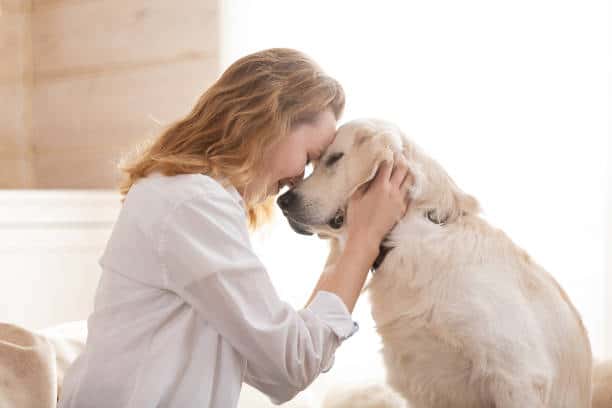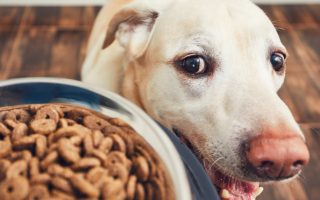Generally, labradors knew for being mild-mannered, affectionate, extremely social, and energetic animals. When compared to other breeds, they require less attention. Even so, there are some health issues that, if not taken care of, might bother your furry little buddy. Down below we’ve given some of the common health-related complications that every Lab owner should be aware of. Here’s a list of the top 9 common labrador health problems issues found in Labradors with their best remedies.

1. JOINT ISSUES:
Joint problems this is the first common labrador health issues that occurs as elbow or hip dysplasia is a typical disorder that causes Labradors to suffer from excruciating pain and become sluggish. Hip dysplasia usually occurs in older dogs but has recently been found to trouble younger dogs as young as 5 to 6 months as well. It’s triggered by the dog’s femur head or the ball not fitting accurately into the hip joint.
REMEDY:
The best way to avoid such an issue is to take extra care of your Lab’s health. Provide it with the highest quality of food brimming with plenty of nutrients, and encourage daily exercising like swimming. Supplements are also an excellent remedy to reduce any budding symptoms. However, recommended visiting your vet before optioning for any pain-numbing drugs or supplements. It is also suggested to keep an eye on your canine’s weight as an increasing heaviness may elevate the stress on the joints as well.
2. CORPULENCE OR OBESITY:
Corpulence or obesity is the second and one of the most common health issues found in labrador. It is fortunately also one of the easiest ones to avoid. Obesity can lead to other bitter diseases such as diabetes. Labradors overeaters, so don’t let those puppy-dog eyes trick you into thinking he’s famished.
REMEDY:
Just pay attention to your Lab’s eating patterns and make sure they don’t overeat. You’ll have to limit its meals by preparing suitable portions whenever mealtime comes around. Regular exercise is also a good idea to cut back on some weight. If not yourself, a visit to the vet and getting a meal chart prepared is an option you can pick up.
3. INFECTIONS IN EARS:
Also recognized for their lovable, saggy, and floppy ears, giving them an endearingly funny demeanor. But these enormous ears are also the same reason your Labs may catch ear infections. As they offer an ideal environment for bacterial growth. So if you find your furry canine shaking its head more than often and pawing its ears, then it might be suffering from an ear-based disease. A leakage, foul odor, or constant irritation are symptoms of an ear infection. If you suspect your Labrador for suffering from one, it is suggested to visit the veterinarian for a thorough diagnosis and grab some antibiotics prescribed.
REMEDY:
Keep your Labs’ ears nice and clean in order to help stop ear infections. Make sure to dry off his ears after bathing or swimming. Trimming off any excess hair growth within the ears is also a great way to keep his ears squeaky clean and far from any disgusting bacteria. Scheduled visits to a groomer can also ensure a healthy and infection-free Labrador.
4. HEART DISEASE:
Heart conditions are often found in older-aged dogs, but that doesn’t mean younger ones can’t suffer from one. The best form of preventive is general well-being. Common symptoms of cardiac disease include coughing, abdominal swelling, tiredness, rapid weight loss, and poor appetite. If your canine shows any of the signs as mentioned above, an immediate checkup is necessary. In short, Tricuspid Valve Dysplasia or TVD is the most frequent cardiac condition that occurs mainly in male Labs. It is an abnormality present since birth in the valve on the heart’s right side. As of now, there is no complete cure, but a vet may prescribe some medications as well as limit your Lab’s exercise in order to avoid putting undue stress on his heart.
REMEDY:
Just like any ordinary human suffering from a cardiac condition, a vet would recommend similar remedies for a Lab as well, involving good quality, healthy food, plenty of water to drink, and routine exercise. Keeping your Labrador up-to-date with all of his vaccinations is something you should also keep at the top of the list.
5. ALLERGIES:
Allergies are as bad for your Lab as they are for you. Labs mainly, female Labs appear to be more susceptible to allergies as compared to other types of dogs. Some of the many reasons for allergies may include pollen, food, fleas, etc. So if your furry friend seems to be feeling itchy more than usual, displaying dry skin, shedding too much hair, or showing symptoms of an ear infection, they might be under the weather. Also, too much scratching can lead to other infections, so noticing allergy symptoms early on might save your Lab from any future pain.
REMEDY:
Once again, a visit to the vet may be the solution to your problem. Getting your Lab checked and following the doctor’s prescriptions can relieve your dog from discomfort. Allergies don’t completely cure but can lessen by using your vet’s recommended shampoos or medication. Also, if an allergy acts up because of fleas, eliminating the pesky fleas would help alleviate the problem.
6. CANCER:
Cancer is the leading cause of death in canines aged ten or over. This is likely to occur thrice as much in Labradors as in humans. Fortunately, cancer no longer poses a threat due to the latest advancements in the medical field. However, a timely indication of the disease is crucial for proper medical care to occur. Some general signs of cancer are bleedings, strange swellings, poor appetite, fatigue, a foul odor wafting from the mouth, and weight loss.
REMEDY:
If your dog shows any of the symptoms mentioned above and recommended to land an appointment with your vet immediately. The earlier cancer’s detected, the more will be the odds in your favor. In addition, medications and procedures such as chemotherapy surgery can help in eliminating cancer from your Labs’ body.
7. COLLAPSE CAUSED BY EXERCISE:
Collapsing due to exercise appears to affect younger or active dogs more. Dogs occurs observed to suddenly wobble and fall during their play-time or exercising, with their back legs appearing out-of-control and weak. Fortunately, dogs seen to recover from this dilemma within a short span of 5 to 10 minutes, but in some unique circumstances, a dog has perished as an outcome of this disease.
REMEDY:
Suppose the Labs’ exercise is carefully monitored, is maintained at a reasonable level, and is stopped when he becomes shaky or stumbles. In that case, they can continue on their everyday lives despite suffering from EIC. Exercise-induced collapse genetic and does not consist of any cure, but despite this, your dog can still lead a healthy life as long as he observed.
8. BLOATING:
A Labrador suffering from bloating is not as harmless as it sounds. Bloating causes by Labs that consume food too quickly, filling up the dog’s stomach with gas and eventually causing it to twist. This twisting exerts pressure on the surrounding internal parts preventing the canine from throwing up. A distended stomach, uneasiness, as well as attempts to vomit are some of the signs of bloating.
REMEDY:
The most straightforward approach to stop your Lab from acquiring this ailment is to keep an eye on his eating and drinking patterns. Overeating, drinking water too hastily or exercising right after a meal is not a good idea and needs to prevent the safety of your Lab.
Another solution is to take your dog to the vet for to appropriate medication prescribed, which would help alleviate the gas present in his stomach and hydrate him. Surgery might be necessary if his stomach has already undergone twisting.
9. PANOSTEITIS:
This disease usually manifests itself as lameness in one of the forelimbs, which might subsequently spread to the other appendage the next day if not taken care of immediately. Typically characterized by swelling of the front limb’s bones. Even though it is a severe condition, it tends to resolve independently.
REMEDY:
Discussing your pet’s condition with the vet during his monthly checkup is a good idea to detect any early symptoms if in the developing phase. The vet may prescribe drugs that can aid with the inflammation and discomfort. Ensuring the dog rests as he recovers and heals for many days ensue suggested.
CONCLUSION:
As much as we don’t want man’s best friend to develop any of these ailments, there is no way to prevent this from ever happening. But, as emphasized above, several steps can take in order to ensure your Lab lives an absolute content, cheerful, and carefree life. Being attentive and responsible about your pet’s health, needs, and the condition is the best way for you to watch that lovable goofball play in your backyard for years to come. Some of the common labrador health issues can see in labs.







